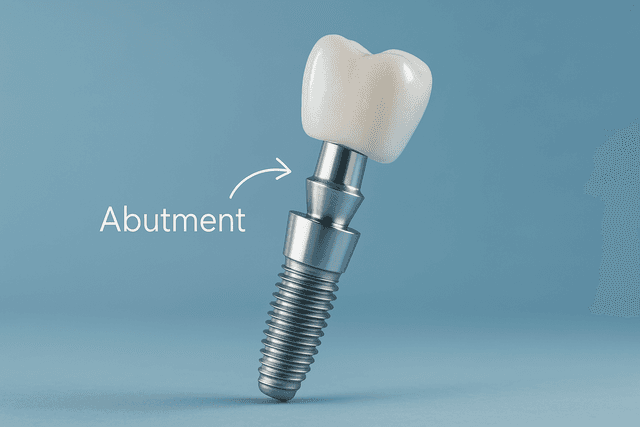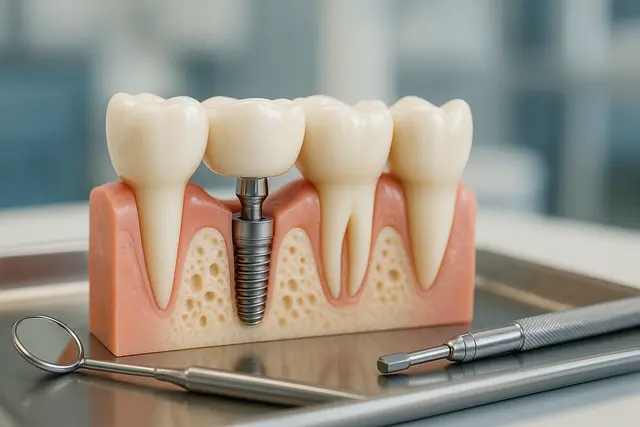Prosthodontics
6 min read
May 23, 2025
Pictures of Good Fitting Dentures: What Proper Fit Should Look Like
When it comes to dentures, fit isn’t just about comfort, it’s the key to eating, speaking, and smiling with confidence. But what exactly does a proper fit look like?

If you’ve ever popped in your dentures and thought, “Is this how they’re supposed to feel?”, you’re not alone. For many folks getting a new set of dentures, the line between good enough and a perfect fit isn’t always clear. The truth? Dentures that fit well don’t just stay put. They give you back your bite, your words, and your reason to smile.
Let’s take a deeper look at what pictures of good fitting dentures really look like, yes, we’re talking about those pictures you may have seen online, and why getting that fit just right makes all the difference in comfort, function, and confidence.
The Denture Fit Difference
Dentures aren’t one-size-fits-all. Whether it’s full dentures replacing every tooth or partials that bridge the gap between remaining teeth, fitting dentures should look and feel like a natural part of your mouth. That means no pinching, slipping, or sore spots. Instead, you should feel secure enough to eat a crunchy apple without second-guessing yourself, or your smile.
Poorly fitting dentures, on the other hand, are a recipe for frustration. They wobble when you talk, trap food particles, and can rub your gums raw. Over time, they might even change shape because your jawbone adjusts without the natural pressure of real teeth. That’s why regular check-ups can help prevent discomfort before it starts.
Smile Gallery: What Good Fitting Dentures Look Like
Want to know if your dentures are doing their job? Look at the smile gallery from any trusted dental provider. Pictures of good fitting dentures will show you a few key things:
They sit snugly against the gums without gaps or tilt.
The bite lines up naturally, no overbites or awkward jaw shifts.
They look like natural teeth, with color, shape, and alignment that suit the patient’s face.
The gum line appears smooth, without pressure points or puffiness.
A good visual clue? If someone’s smiling in the photo and you can’t tell they’re wearing dentures, that’s a sign of proper fit and craftsmanship.
Partial Dentures and Why They Matter
Partial dentures step in when you’ve got some teeth remaining and need to fill in the blanks. They usually come with a clasp that anchors to existing teeth, offering balance and support. But here’s where many people go wrong: thinking “partial” means “secondary.” A partial denture still needs just as much precision and customization as a full set.
When partials fit better, you chew more evenly, protect your natural teeth from shifting, and reduce strain on your jaw. Plus, they help you improve your appearance without going all-in on implants right away.
Full Dentures: The New Smile Standard
Let’s talk about full dentures. These replace all teeth on the upper, lower, or both arches. They’ve come a long way from the oversized, cookie-cutter versions of the past. Today’s quality dentures are sculpted to match your face, giving you a natural look that restores both function and a youthful appearance.
A lower denture in particular needs special attention. Because the bottom arch moves more (thanks, tongue), fit is even more critical. It should contour to your gums without floating or popping up when you talk. Digital dentures can now be custom-made using 3D scans, offering better precision and less guesswork.
Implant-Supported Dentures: The Secure Solution
If you’re tired of slipping dentures or soreness from poor fit, implant-supported dentures might be your best friend. These use dental implants, tiny titanium screws placed in the jaw, to hold dentures in place. Think of them as the seatbelt your smile didn’t know it needed.
This option blends the stability of implants with the full-arch coverage of dentures. Plus, snap-in dentures allow you to remove them for cleaning without losing that secure bite. Implant dentures help improve the fit, preserve bone, and feel the closest to natural teeth.
Denture Options for Every Mouth
There’s no one-size-fits-all solution here. Some people go with immediate dentures so they never have to go without teeth, even after teeth are removed. Others wait a bit and choose a new denture once healing settles.
Here’s a quick glance at the options available:
Full and partial dentures: Great for varying levels of tooth loss.
Implant-supported dentures: Ideal for those who want long-term comfort and security.
Digital dentures: For those looking for precision and fast turnarounds.
Snap-in dentures: A flexible, secure alternative to traditional removable ones.
Each one has its place, depending on your oral health, lifestyle, and budget. Choosing the right dental plan means working with a dental professional who understands your goals, and your mouth.
What Proper Fit Should Feel Like
Here’s the truth: well-fitting dentures disappear from your thoughts after a while. You forget you’re even wearing them. They should:
Stay secure while eating or speaking
Avoid rubbing or creating soreness
Maintain a comfortable seal without extra adhesive
Blend seamlessly with your natural appearance
When the teeth look like your own and feel secure from breakfast to bedtime, you know you’ve found your perfect fit.
What Happens When Dentures Don’t Fit Right
Poorly fitting dentures aren’t just a nuisance, they’re a health risk. They can lead to:
Inflammation or ulcers on the gums
Jaw pain and muscle strain
Trouble chewing (which affects nutrition)
Speech issues
Embarrassing slips during social moments
Your mouth changes over time, especially after tooth loss. Dentures typically last 5–10 years, but your jaw and remaining teeth may shift sooner. That’s why regular check-ups can help catch fit issues early.
A Quick Word on Maintenance
To keep your new smile shining, take care of your dentures the same way you’d care for natural teeth. Brush them daily, soak them overnight, and avoid using boiling water or abrasive cleaners. If your dentures start to feel loose, painful, or you notice red spots on your gums, don’t wait, schedule an appointment.
And don’t forget to clean around dental implants if you have them. A soft-bristled brush and gentle technique will keep the area healthy and secure.
FAQs: Dentures, Fit, and What to Expect
We get a lot of frequently asked questions, so here are a few quick answers:
How long do dentures take to get used to?
Most people adjust in a few weeks. If you're still struggling after that, something may need tweaking.
Can dentures improve my speech?
Yes. Once they fit right, they support your tongue and lips for clearer pronunciation.
What if I’m not happy with the way my dentures look?
Let your dentist know. Dentures are made to match your smile, and adjustments are often possible.
Will I still look like me?
Yes, with today’s customization options and quality materials, dentures can improve your looks without changing who you are. Expect a natural-looking, comfortable smile that brings back your confidence to smile.
Final Thoughts
Dentures not only enhance how you look, they restore how you live. The right fit is the difference between mumbling through dinner and laughing out loud without worry. If you’re considering a new set of dentures, don’t settle for something that “mostly fits.” Go for the best denture you can get, crafted to meet your needs and support your lifestyle.
Want to see what dentures that look real can do? Visit our smile gallery or schedule an appointment today. Whether it’s your first set or an upgrade, we’ll help you find your reason to smile again, with new teeth that feel just right.
What Should Good Fitting Dentures Look and Feel Like?
Good fitting dentures should sit snugly against your gums with no slipping, pinching, or sore spots. Visually, they should look natural, matching your facial structure and tooth color, while feeling secure enough to talk, chew, and smile with ease.
How Do I Know If My Dentures Don’t Fit Properly?
Signs of poor fit include movement while talking or eating, sore spots on the gums, and the need for constant adhesive. Over time, bone loss can also change how dentures fit, so regular dental checkups are key.
Are Implant-Supported Dentures Better Than Traditional Ones?
Implant-supported dentures offer greater stability, prevent bone loss, and feel more like natural teeth. While they require a surgical procedure and cost more upfront, they’re a long-term investment in comfort and confidence.
Can My Dentures Be Adjusted If I’m Unhappy With the Fit or Look?
Yes. Dentists can often adjust the fit or even remake the denture to better match your preferences. Whether it's improving comfort or tweaking aesthetics, it’s worth speaking up to get a smile that truly feels like yours.
Read Next
Related Posts

Prosthodontics
Caring for Implant Supported Bridges: How to Keep Them Strong and Healthy
Caring for your implant-supported bridge is just as important as getting it placed. These restorations are designed to look, feel, and function like natural teeth, but they need consistent care to stay that way. With the right cleaning habits and maintenance routine, you can protect your investment and keep your smile strong and healthy for years.
5 min read
Oct 14, 2025

Prosthodontics
Implant Abutment Explained: What It Is and Why It Matters
Dental implants have revolutionized the way we restore missing teeth, but there's more to them than just the visible crown. One often-overlooked component, the implant abutment, plays a crucial role in both the function and appearance of the final result. Understanding what it is and why it matters can make all the difference in your implant journey.
4 min read
Oct 10, 2025

Prosthodontics
Pros and Cons of Implant Retained Bridges: A Simple, Honest Overview
Missing teeth can affect more than just your smile, they can impact your confidence, speech, and even how you eat. With so many options out there, it’s easy to feel lost in dental jargon and marketing buzzwords. That’s why we’re breaking down implant retained bridges in plain English, highlighting the pros and cons so you can make an informed choice without the fluff.
6 min read
Oct 10, 2025
Don’t have time to research every dentist around you?
See why 30k+ patients trusted us